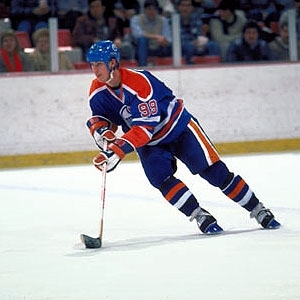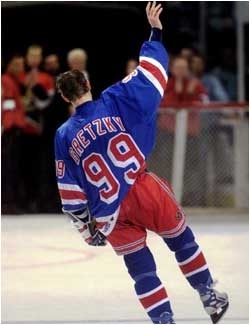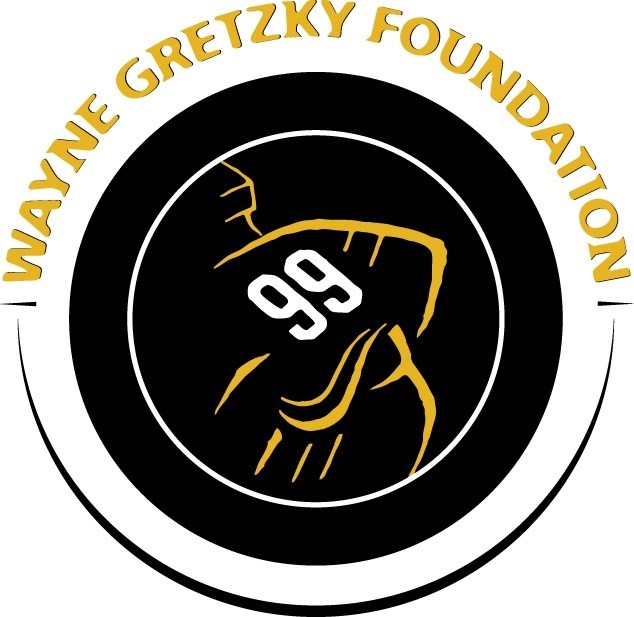 |
| (http://www.realclearsports.com/blognetwork/rcs_sidelines/Gretzky%20Oilers2.jpg ()) |
"A good hockey player plays where the puck is. A great hockey player plays where the puck is going to be." - Wayne Gretzky. This is my hero. Born in Brantford, Ontario, Wayne Gretzky watched his father skate and took an immediate liking to the sport. When he was six years old, his father, Walter, built a rink in the family's backyard, and it was there that Wayne skated for hours on end, practicing his skating, shooting and stick-handling and learning everything about the game from his dad. Gretzky would go on to be one of the greatest players in NHL history, donate hundreds of thousands of dollars to charity and brought a style and level of play that serve as an icon of what it should mean to be an athlete.
When he was 14, he decided that the pressure of playing in his small hometown was too great and jealous players and parents made him unhappy. He decided to move to Toronto and there he played for the Toronto Nats. His coach, Dick Martin, remarked that he "handled the puck better than the 18-year-olds." When he was 15, he played three games with the Peterborough Petes in the Ontario Hockey Association as an emergency call-up, and even then the Great One impressed scouts with his abilities despite his small stature and youth. The next year, 1977-78, was his only full season in the OHA, and he finished second to Bobby Smith in the scoring race while playing for the Sault Ste. Marie Greyhounds. It was there that he first adopted the number 99. Gretzky also represented Canada internationally for the first time in January 1978 at the World Junior Championship in Quebec City.
In 1978, the World Hockey Association (WHA) league was in competition with the established NHL. The NHL did not allow the signing of players under the age of 20, but the WHA had no rules regarding such signings. Several WHA teams courted Gretzky, notably the Indianapolis Racers and the Birmingham Bulls. Birmingham Bulls owner John F. Bassett wanted to confront the NHL by signing as many young and promising superstars as possible and saw Gretzky as the most promising young prospect, but it was Racers owner Nelson Skalbania who signed 17-year-old Gretzky to a seven-year personal services contract.
 |
| (http://www.nhlsnipers.com/wp-content/uploads/2010/12/gretzky_rangers.jpg ()) |
After the World Hockey Association folded in 1979, the Edmonton Oilers and three other teams joined the NHL. Gretzky's success in the WHA carried over into the NHL, despite some critics suggesting he would flounder in what was considered the bigger, tougher, and more talented league. The Oilers, like the other surviving WHA teams, were allowed to protect two goaltenders and two skaters from being reclaimed by the established NHL teams. Under normal circumstances, Gretzky would have been removed from the Oilers and placed in the pool for the 1979 NHL Entry Draft, but his personal services contract prevented this. In 1988, Gretzky was traded to the Los Angeles Kings and was made their alternate captain. He made an immediate impact on the ice, scoring on his first shot on goal in the first regular-season game. Player Mario Lemieux had said that "Wayne is doing well enough that I would not mind if he took my record, but I'll regret that it's with the Kings." The Kings got off to their best start ever, winning four straight on their way to qualifying for the playoffs. Despite being underdogs against the defending Stanley Cup Champion Edmonton Oilers in the Smythe Division semifinals, Gretzky led the Kings to a shocking upset of his old squad, leading the Kings' return from a 3-1 series deficit to win the series 4-3. He was nervous that Edmonton would greet him with boos, but they were eagerly waiting for him. For only the second time in his NHL career, Gretzky finished second in scoring, but narrowly beat out Pittsburgh's Mario Lemieux (who scored 199Â points) for the Hart Trophy as MVP. In 1990, the Associated Press named him Male Athlete of the Decade. From 1996 to 1999 Gretzky ended his professional playing career with the New York Rangers, where he played his final three seasons and helped the team reach the Eastern Conference Finals in 1997. The Rangers were defeated in the Conference Finals in five games by the Philadelphia Flyers, despite Gretzky leading the Rangers in the playoffs with 10 goals and 10 assists. For the first time in his NHL career, Gretzky was not named captain, although he briefly wore the captain's 'C' in 1998 when captain Brian Leetch was injured and out of the lineup. After the 1996-97 season, Mark Messier signed a free agent contract with the Vancouver Canucks, ending the brief reunion of Messier and Gretzky after just one season. The Rangers did not return to the playoffs during the remainder of Gretzky's career.
 |
| (http://www.db4wine.com/wp-content/uploads/2011/03/Wayne-Gretzky-Foundation.jpg ()) |
Wayne Gretzky is a hero because ever since he was a child, his parents had taught him to be humble and grateful for his talents and life, and he carried those values to the NHL and stardom. After Gretzky had been inducted into the NHL Hall Of Fame, he announced that he had begun a foundation to provide less fortunate youth with the opportunity to experience the sport of ice hockey. Through fundraisers and personal donations, the Wayne Gretzky Foundation has donated over 60,000 new and used pieces of equipment for kids in need. The foundation also lets children come to professional hockey games and see their idols in action. Gretzky also owns a winery called the Wayne Gretzky Estates Winery, which donates a portion of all proceeds to the foundation.
Another reason I consider Gretzky a hero is because of his contributions to the game. The United States' hockey associations had been having hard years and were not getting television views and ticket sales they had used to, Wayne Gretzky had helped to end that. Gretzky used his intellect and knowledge of the game to revolutionize the style of play, "A great player skates to where the puck will be." This method of play helped Gretzky to score over 1000 NHL goals. His size, strength, and basic athletic abilities were not considered impressive. As an 18-year-old NHL rookie in 1979, he was considerably underweight at just 160 pounds. Many critics argued at that time that Gretzky was "too small, too wiry, and too slow to be a force in the NHL". Although he managed to increase his weight to 185 pounds by the end of his career in 1999, that was still much less than the NHL average. During his years with the Oilers, the team conducted individual strength and stamina tests twice per year. According to Gretzky himself, he always finished dead last in peripheral vision, flexibility and strength, and could only bench press 140 pounds. On the other hand, his intelligence and reading of the game was unrivaled, and he could consistently anticipate where the puck was going to be and execute the right move at the right time, Hall of Fame defenseman Bobby Orr said of Gretzky, "He passes better than anybody I've ever seen. And he thinks so far ahead." He was considered one of the most creative players in hockey. "You never knew what he was going to do," said hockey Hall of Famer Igor Larionov. "He was improvising all the time. Every time he took the ice, there was some spontaneous decision he would make. That's what made him such a phenomenal player." Gretzky's ability to improvise came into the spotlight at the 1998 Olympics in Japan. Then an older player in the end of his career, he had been passed over for the captaincy of the team, but as the series continued, his unique skills made him the team's real leader.
Wayne Gretzky's love for the game of ice hockey stemmed from his father Walter. Walter had bought his son his first pair of skates at the age of three. After seeing Wayne's uncanny ability to stay upright and use his stick as an extension of himself, Walter Gretzky had decided to build a rink in their backyard. His father had always told him that "the best player was the one who was quiet and respectful off the ice and the smartest on the ice." Gretzky had carried these values on with to the NHL and was considered not only one of the best players in the league, but one of the most humble and respectful. I consider this mindset one only a true player could have. When people say Gretzky is "the king," they say it because he proved himself throughout his entire career and always worked hard to be the best he could be. His values motivate people to be the best they can be.
Gretzky gives his time to countless other charitable endeavors. He serves as an Athlete Ambassador and Honorary Member of the Board of Trustees of Right to Play, an athlete driven humanitarian organization that uses sports to enhance child development in some of the most disadvantaged communities in the world. Gretzky also is a participant in "Hands That Shape Humanity," a project for the Desmond Tutu Peace Centre. For two decades, the great Wayne Gretzky lifted hockey to new and incredible heights while establishing himself as the greatest player of all time. He transcended hockey and was the most statistically dominant player in the history of North American team sports, an athlete who ranks with basketball's Michael Jordan and soccer's Pele as one of the greatest offensive forces in the history of any sport and a man whose name is mentioned in the same breath as Muhammad Ali as one of the greatest athletes of the 20th century. This is why Wayne Gretzky is a Hero.
WORKS CITED
Diamond, Dan. "Hockey-Reference.com | Hockey Statistics and History." Hockey-Reference.com. Web. 11 May 2012. http://www.hockey-reference.com/.
Gretzky, Wayne D. "The Official Website for Wayne Gretzky | Gretzky.com." The Official Website for Wayne Gretzky | Gretzky.com. Web. 11 May 2012.
Page created on 5/28/2012 12:00:00 AM
Last edited 5/28/2012 12:00:00 AM
